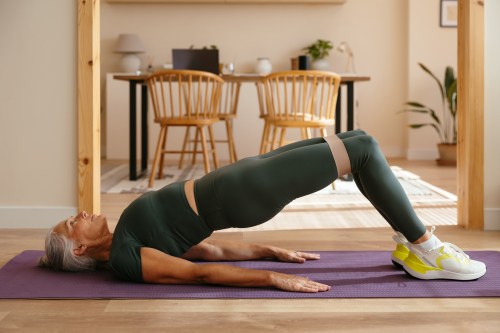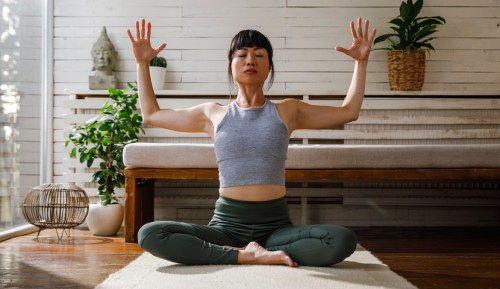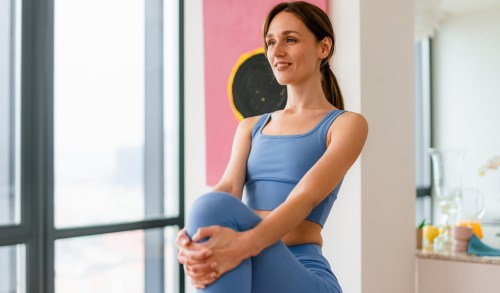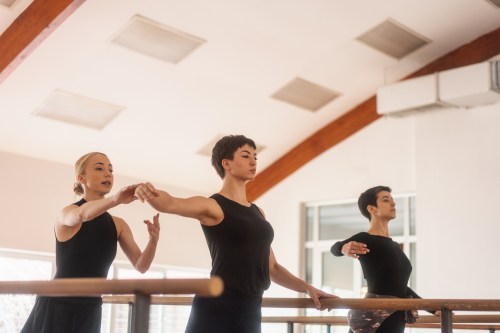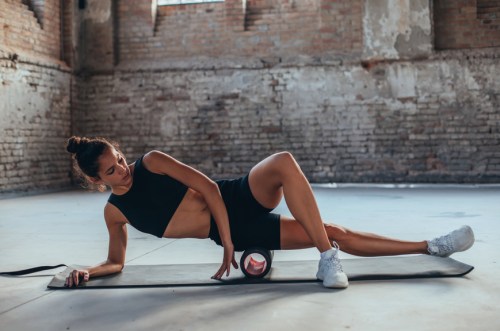I rode 3,700 miles across the country on my bike solo
One woman took on the challenge of cycling from the west coast to the east coast. Here's what she learned along the way
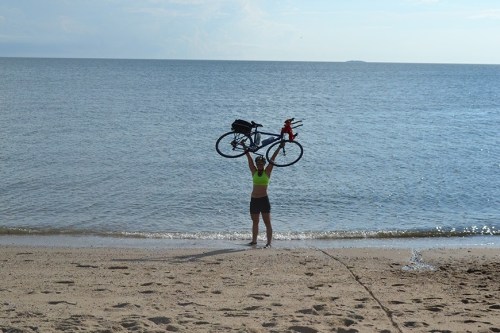
This summer, while most people were packing up the office early on Friday afternoons to head to the beach, BBQ, or Barry’s Bootcamp, 29-year-old Taylor LaRese was on her bike. And we’re not talking a pre-Hamptons-escape SoulCycle class: LaRese spent 58 days riding 3,700 miles—mostly by herself—from the west coast to the east. The Southington, CT, native is a second-year medical student at the University of Connecticut (she’s leaning toward an emergency medicine specialty), and spent her summer riding 80 miles a day while raising money for Mental Health Connecticut. But what started as a goal to raise money and awareness for others ended up providing a huge shift in LaRese’s own mental health. Here’s her story, in her words.
Every year, a group of students from my med school goes on a cross-country bike tour. After a few years working as a researcher at the school and seeing updates from the trip, I knew it was time to take advantage of this incredible opportunity. I was ready to be a part of it.
The bike tour is more than just a ride—we also choose a charity to raise money for. We wanted our dollars to go as far as possible and to make a big impact in our local communities, so we chose Mental Health CT, which is a nonprofit organization devoted to advocacy, service, and education for the betterment of Connecticut residents’ mental health. (The group has currently raised nearly $14,000.)
On June 14, a group of 10 medical and dental students, myself included, set out to start the ride from Seattle. I’ve always been an athlete, but I’ve been more focused on weightlifting and CrossFit. Doing something so endurance-based was definitely not in my wheelhouse, but the thought of pushing myself to my physical limits has always attracted me, so I was up for the challenge.
Preparation was key. Physically, I kept weightlifting, but I focused more on my back, core, and legs. It was hard getting in training miles while in school full-time, though. If I wanted to ride 40 miles, I needed three hours to do so. Most days I’m out the door at 7 a.m. and don’t get home from classes, meetings, and working with patients until 9 p.m. I also work as an EMT, so it’s a lot to try and balance. The longest training ride I did was 50 miles one weekend. I also took spin classes, rode on the recumbent bike at the gym, and did as much as I could to get my legs moving.
The pivotal moment on this trip, for me, was when I decided to separate from my group.
I had a road bike, but it needed some upgrades, and the ride was completely self-supported. We didn’t have anyone driving behind us or taking care of us. We carried whatever we needed, including our camping gear. And when it came to actually navigating our way from coast to coast, we relied heavily on the students who had done the ride the previous few years.
The plan was to ride around 80 miles a day, taking one day off every 10 days. We took some days easy, like when the weather was bad or there were lots of strenuous climbs, but on others we would just cruise for hours before getting off the bike.
The pivotal moment on this trip, for me, was when I decided to separate from my group. I ended up doing half the ride by myself. I was feeling like the dynamic of the group wasn’t good, and the physical, mental, and emotional demands of the ride were weighing on me. I wanted to really enjoy the experience, so I made the decision to go it on my own. I knew how much better it would be for my mental and emotional health, and that outweighed any fears I had about the risks of riding solo.
I knew how much better it would be for my mental and emotional health, and that outweighed any fears I had about the risks of riding solo.
Once I was on my own, I didn’t run into anything super sketchy, but I definitely had to think differently about my safety, particularly when I was camping at night. One day, while riding in upstate New York, I noticed a car was following me. Was I just being paranoid and hyperaware, or should I be concerned? I pulled over so the car could pass, and the woman driving stopped and asked if I needed a place to stay that night. She said she loves seeing solo female cyclists and wanted to support me. I wasn’t even halfway through my daily miles, so I didn’t take her up on the offer, but that became my biggest takeaway from the trip—how incredibly kind and generous people can be.
One night, I stopped to camp in a really nice park that happened to be hosting a big local celebration. I was setting up my tent when I realized how exposed it felt. All these people were around and could see that I was a female traveling alone. If any of them wanted to come back later and do me harm, I was basically a sitting duck. But as I was getting settled, a couple approached me to make small talk. At the end of our conversation, the man mentioned that he’s the town sheriff, and that if I had any problems, to reach out to him directly, and that he would have a deputy patrolling the water. I felt safe, protected, and reassured thanks to the kindness of strangers.
Most nights, though, I took advantage of the Warm Showers community. These are members of the cycling community who open their homes to other touring cyclists—for free. They made me dinner, gave me somewhere to stay, and just wanted to hear about my journey in return. Along the way, I stayed with a funeral director, a woman who lived in a monastery for two years before deciding she didn’t want to be a nun, and a member of the Wisconsin Bike Hall of Fame who had a debilitating stroke after years of riding.
I did whatever I could to keep any inflammation at bay, and used my Nalgene bottle as a makeshift foam roller.
Of course, there were days I woke up and just didn’t want to get on my bike. Days when I would finish 12 hours of riding and only get a few hours of sleep before getting up to do it all over again. I took a lot of Tylenol and drank a lot of coffee. I did whatever I could to keep any inflammation at bay, and used my Nalgene bottle as a makeshift foam roller. You learn to get very resourceful and creative out on the roads. I also ended up getting around eight flat tires along the way, but fortunately knew how to take care of those.
Trying to maintain the healthiest diet possible on the road was crucial, too. It’s really easy to get a ton of calories from all the fast food places along the way, but I rode with the mentality that my engine is only as good as the fuel in it. Fortunately, my wife sent me a lot of care packages and snacks along the way. I ate a lot of jerky, baby carrots, and snap peas, and focused on getting protein and fat whenever I could. But yeah, there were plenty of cheeseburgers and ice cream, too.
I learned to get really comfortable accepting the generosity of others, whether it was in tangible form or not, and I’m comfortable now voicing my needs.
One thing I didn’t expect was wind. I expected the days through the mountain passes to be physically demanding—some days involved up to 6,000 feet of elevation gain—but I knew I’d get to the top one way or another. But one day in North Dakota, the temperature hit 100 degrees with 15 mph headwinds. Even though the roads were completely flat, it was like pedaling through molasses. It was unrelenting, and exhausted me as much mentally as it did physically. I think by the end of that day, I was actually yelling at the wind, “You’ve got to be kidding me!”
On the last day, I rode 98 miles through the Berkshires to get to the Connecticut shoreline. I was grateful to be finished, but also grateful I made the decision to finish the ride on my own. It was a huge mental health takeaway for me—to make a decision when something wasn’t suiting me and was adding more stress to my life. I learned to reevaluate my options and make the best decision for myself, even if it was the scarier decision. Plus, the trip was a nice reminder of how generous and kind people are. There’s so much on TV, online, in the media right now that isn’t good. It was nice to just be vulnerable on this trip and to learn to take from others. I didn’t grow up that way. If I went to someone’s house and they offered me cookies, I said no thank you. I was taught not to take things or inconvenience people. But I learned to get really comfortable accepting the generosity of others, whether it was in tangible form or not, and I’m comfortable now voicing my needs.
All because I got on my bike.
Here’s the scoop once and for all on whether running or spinning is better for you and this is what to know about spinning but were too afraid to ask.
Sign Up for Our Daily Newsletter
Get all the latest in wellness, trends, food, fitness, beauty, and more delivered right to your inbox.
Got it, you've been added to our email list.
